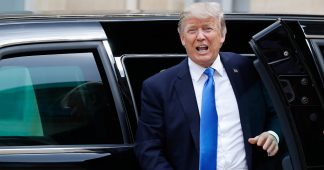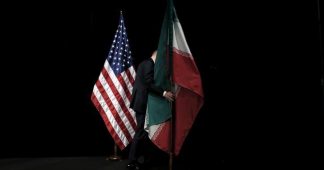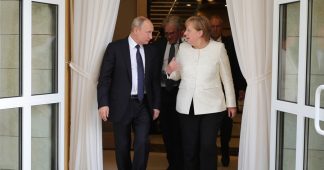Lexit’s Digest Special,
28 February 2019
At the latest Munich Security conference, U.S. President Trump again threatened to impose tariffs on European cars, and his Vice President Pence demanded that Berlin and the EU immediately renounce the Nord Stream 2 pipeline and the Iran nuclear deal. On Nord Stream2, the EU Council reached agreement on a Franco-German compromise just some days before the Munich Security conference. By the way, with the focus on the Russian-German pipeline Nord Stream 2, the plans of the Romanian state for exploiting offshore gas in the Black Sea has pretty much gone unnoticed, amongst other such developments..
At Munich, Pence then threatened that if the EU would not give in to U.S. demands, “we cannot ensure the defence of the West if our allies grow dependent on the East” (meaning Russia and China). A very clear message – obey or we will hunt you down. Thus Trump continues the aggressive neo-con geo-strategy directed against Russia and China of former U.S. Presidents George W. Bush (with his earlier ‘Old vs. New Europe’ rhetoric on the Iraq war) and Barack Obama (‘pivot to Asia’). Trump tries to weaken Germany’s dominance over the EU. Again, as G.W. Bush before him, he is playing on the divisions between western and eastern EU member states on those topics.
The EU has a lot of discussions about how to go it alone on ‘security and defence’ – including the idea that the French nuclear arsenal should be Europeanized, or that Germany might become a nuclear power. But as to now there seems to be no realistic Plan B for the EU’s Nato problem (as even the mainstream politico website concedes). ‘Experts’ and pundits in the EU are hammering out the need for some ‘self-assertion of Europe’. In earlier times, this was the slogan of Germany’s SPD ‘lefties’ in the 1980ies against the stationing of mid-range U.S. nuclear missiles in Europe. However, SPD chancellor Helmut Schmidt promoted the deployment of such missiles in order to face down the ‘Soviets’ – against a majority of his party at that time, and succeeded.
Currently the twist within the EU’s ‘extreme centre’ on this is: the EU should become a ‘global player’ not only economically, but also militarily. Media pundits are realistically observing and deploring the weaknesses and difficulties of the current EU in moving fast forward to such perspectives for structural, historical and conjectural reasons (Brexit, French geo-strategy vs. German ambitions, Eastern European governments in between the U.S. and the EU on this, etc.). Despite PESCO (as the EU’s answer to the supposed ‘Russian threat’), and despite the ‘European Intervention Initiative’, designed to strengthen the EU’s rapid intervention forces (with the UK as its partner) to intervene foremost in the former European colonies in Africa as Europe’s ‘historical backyard’ (see e.g. the respective EU interventions in Mali, Somalia etc.)
Despite official commitments of the EU to preserve the Iran nuclear deal, behind the scenes some member states argue for a tougher line on Iran – as a response to U.S. threats. The so-called special purpose vehicle set up by the EU to allow European countries to keep trading with Iran despite U.S. sanctions doesn’t seem to work well: the major EU based multinationals do not use it, fearing retaliation from the U.S. on their business activities in America. Currently, only SME’s with an interest in the Iran business are using it.
The recent U.S. withdrawal from the Intermediate-Range Nuclear Forces Treaty (INF) could possibly start a new arms race against Russia and is already being used as a big stick to further divide the EU, if Germany in particular does not comply with Trump’s demands. Already in 2016 the U.S. installed a ballistic missile site in Romania – supposedly to create a missile defence shield against Iran, but more probably against Russia – to be followed by establishing other sites in Poland and possibly Bulgaria. The governments of those countries have only been too keen to host such missile sites to protect their countries against a perceived ‘Russian threat’. With the INF-Treaty becoming defunct, the Western EU member states fear they will be left in the cold. If there are no renewed ‘security guarantees’ coming from the U.S. – for which they know they will have to pay a price in complying to Trump’s demands, what should they do …
The governments of the Western EU member states do not earnestly believe that Putin would send the Russian army to invade the European Union. Such a ‘Russian threat’ is a mere chimera: the U.S. military spending in 2019 is projected to reach $716 billion (3.7 percent of GDP), China’s $224 billion (2.8 percent of GDP) – but Russia’s for the same year is about $60 billion (according to SIPRI) or $44 billion (2.8 percent of GDP) according to other Western estimates. Germany’s military budget (€23.8 billion in 2000) is expected to reach $49.1 billion in 2019 (1.3 percent of GDP) – so already on a par with Russia’s. If Germany would spend 2 percent of its GDP on its military as projected by Nato, it would rise to around some $80 billion.
Professor Paul Rogers (department of peace studies at Bradford University, UK) rightly points out the dangers of that evolving arms race and the geo-strategy of the U.S. seeking to revert its relative (economic) decline. Add to this the Pentagon’s plans to modernize its nuclear arsenal (‘mini nukes’ that can be used in tactical warfare) and to make such tactical nukes a corner stone of its ‘pivot to Asia’ strategy. So there are very alarming developments on the horizon, the future for ‘world peace’ looks bleak …
In his 2015 piece on Putin’s Russia (still a very interesting read), Perry Anderson concluded: “Too small to qualify as a Great Power on a level footing with America or China, or in a foreseeable future with India; too big to fit into Europe, or find its place among other denizens of the ‘international community’. To its misfortune, Russia is geopolitically between sizes.” Economically Russia is merely a country depending on exports of raw materials and military equipment, with its GDP shrinking or stagnating.
On China, see the recent analysis by Robert Brenner (interviewed by Victor Shih) on its ‘credit conundrum’. And also Susan Watkins‘ illuminating piece about ‘America vs. China’.
Consider a U.S. geo-strategy built on the idea of a ‘pincer move’ to block China’s further rise and to reinforce its dominance over Europe. In that neo-con logic, Russia with its vast resources should fall prey to the West, in order to reassert ‘Western’ control over the ‘Eurasian heartlands’. And to block any alternative that the EU, Russia and China should co-operate, e.g. along the ‘One Belt, One Road’ initiative, coupled with establishing a system of collective security, peace and disarmament.
Hence, the upshot is this: The U.S. under Trump is further radicalising its neo-con geo-strategy against Russia and China. The EU is complying to this pressure to a great extent, but still partly hesitating and resisting to completely follow suit to the Trump administration’s demands.
Germany’s chancellor Angela Merkel shares the U.S. and Nato’s anti-Russia policies, but not when it comes to Nord Stream2 etc.. She offered some compromise with Trump on re-negotiating WTO rules with China, getting China on board to talk about an agreement on mid-range nukes etc., and proving her willingness (together with French President Macron) to hike up military spending and that the EU becomes more active e.g. in Africa to ‘contain islamist Jihadism’. Behind the scenes there is certainly inter-imperialist rivalry within the Western bloc, as always was.
But the EU’s ‘grand powers’ France and Germany are very concerned about the U.S. pressure on them, and they are weakened by internal problems at home. As the transatlantic partnership to which they feel committed gets more and more strained, and as the EU grandees fear economic competition from China just as the U.S. elites do, their responses are highly contradictory and ‘rudderless’ (even in terms of promoting ‘Western capitalism’). Their pledge for ‘multilateralism’ is quite empty (and based on the hope that the EU needs more time to become stronger to compete with the U.S. and China).
As Thomas Palley put it: “The consequences of the EU bloc’s rudderless geopolitics are proving disastrous. First, the EU has experienced the backwash of US Middle Eastern wars in the form of refugees and increased terrorism risk. The refugee problem in turn interacts with the internal immigration problem created by EU expansion, so that US geopolitics is now feeding EU disintegration. Second, siding with the US in its aggressive manufactured conflict with Russia risks more collateral backwash damage, as well as possibly damaging the European economy. Third, it is becoming clear that US neocons view Europe as a very junior partner that can be bossed about.” Instead of seeking detente and peaceful co-operation with Russia and China, the EU’s strife for becoming a global player able to project its economic and military power all over the world is a further threat to world peace.
Wolfgang Streeck comments upon Germany’s role within the EU as a ‘liberal Empire’, as he sees it: “Filling the position of hegemon in a liberal empire is far from easy, and in fact, it is becoming increasingly clear that Germany will not for long be able to do so. ( …) Whether Germany post-Merkel will actually be able and willing to deliver on the two per cent is an open question. There will also be a need for imperial side payments to the Mediterranean countries that suffer under the German hard-currency regime, and for “structural funds” supporting the Eastern European states and their “pro-European” political class. With France suffering from low growth and high deficits, it is only Germany that will be asked to chip in, the required order of magnitude easily exceeding its abilities.”
All that told – is the Trump administration moving forward to some modernized form of ‘fascism’, as pundits on the liberal right and the left in the U.S. are claiming? New Left Review’s author Dylan Riley reminds us of historical fascism and explains why such an hypothesis is not tenable.
Some fall-out from the empire(s) of chaos
U.S. neo-con geo-strategy and the support for this from quite a number of EU member states led to a massive fall-out: ‘failing states’, war, streams of refugees, to cite just a few consequences. What follows, are just some picks on some contries and events which are currently under discussion. Providing links to interesting articles on all these issues would be ‘book-length’. So please accept these few hints:
- Afghanistan: Matthew Hoh (of the advisory boards of Expose Facts, Veterans For Peace and World Beyond War and a former U.S. Marine) writes about his experience with the escalation of the Afghan War and argues that it is ‘time for peace in Afghanistan and to end the lies’;
- Libya/Venezuela: Brian Cloughley compares the US-Nato crackdown on Libya in 2011 to the recent efforts to bring down Venezuela’s ‘socialist dictator’ Maduro – an interesting read. John Pilger provides his assessment of Venezuela since Chavez and the U.S. policy to get the country back under control. The U.S., the EU and the neo-liberal right-wing governments from Latin America recognized Venezuela’s opposition leader Juan Guaidó as the legitimate ‘president’ (or interim-president) of that country. They supported his campaign to get ‘humanitarian aid’ (food, medicine) from the U.S., Brazil and Columbia into the country, which Maduro’s government blocked successfully. Meanwhile, Maduro accepted that the EU should deliver such supplies – it remains to be seen whether the EU keeps its promises. Timothy M. Gill explains why the Venezuelan government rejected U.S. food supplies.
- Syria: Patrick Cockburn (the renowned critical Middle East correspondent of the UK Independent) opined that Trump’s Syrian Withdrawal was an act of political realism. Richard Falk blew in the same horn on the Syrian pull-out and suggested that ‘Trump might not know exactly what he is doing but bypassing Europe for a geopolitical bargain with Moscow might make realist sense under the historical circumstances, and realists themselves need to wake up to this benign possibility.‘ Well, just check the Munich Security Conference, whether there is any sign for detente between the U.S. and Russia … As the website German Foreign Policy.com explains, after the Syrian pull-out there is an emerging ‘scorched earth policy’ by both the U.S. and (reluctantly) the EU to sanction all companies and countries lending support to Syrian government projects to rebuild that country. Remember the Western sanctions on Iraq in former times, starving thousands of children and civilians to death through this? Got the picture?
- Ukraine: This is definitely a major (Eastern) European theatre for the U.S. neo-con strategy (and also for the EU). So firstly – regarding the fight between the Western powers and Russia’s ‘Eurasia’ strategy- an interesting report (whether true or not) from politico on the Ukraine as an experimental battlefield for cyber-warfare, commenting on all sorts of disinformation and propaganda (as usual, in poltico’s view, Russia is the main culprit). Also from politico, why the next Ukrainian election might become a joke (informative, but not so serious). If you are interested in more in depth information – 2019 is an anniversary of the ‘Euro-Maidan’ in the Ukraine – please read Jacobin’s interview with Volodymyr Ishchenko on past and present policies in that country and its perspectives. See also that author’s earlier findings as a researcher on the role of the far right in the Euro-Maidan protests (The Denial of the Obvious) here.
By the way, in the early days of the Euro-Maidan protests there was a group of good looking ‘Europeanist’ female students on stage (generation ‘Erasmus’, confident and hoping to join the EU’s programme, with huge EU flags behind them). They were encouraging the crowds to ‘hop’ in order to demonstrate their hostility towards the ‘Muscovites’ (meaning ‘Bolshevism’ and Russia). Anybody who did not ‘hop’ with them, so they said, is a ‘Muscovite’ in that sense. This is the same pattern that Berlusconi successfully applied in his electoral campaigns in the 1990ies in Italy. Everybody who did not ‘hop’ with him – and all his ministers in business suits reluctantly did – was to be regarded as ‘a communist’ and an enemy of the Italian nation. As the European radical left largely has lost its historical memory, not many of them seem to have noticed this analogy.
Trade, economy, finance (also in geo-political perspective)
Let’s start with trade. Now there is NAFTA 2.0 in place, which U.S. President Trump claims as a success for his ‘America First Strategy’, benefiting U.S. workers at large. And rightly so there is the respective criticism from the left. Sam Gindin explains what all this is about. Canadian trade unionist Bruce Allen digs deeper into the issue what NAFTA 2.0 means for workers.
The European Union concluded a free trade and investment agreement with Japan in response (JEFTA), which entered into force on 1 February 2019. For a short (mildly) critical overview see here. JEFTA also contains clauses on the Investor-state dispute settlement (ISDS) mechanism, rightly criticized by NGOs of all sorts and trade unions. Finally, whoever thought that TTIP is dead because of Trump, should have a second look: Corporate Europe Observatory informs about the recent negotiations between the EU and the US on trade.
The upshot on all this: neo-liberalism is not dead (whatever some lefties thought that Trump etc. would bury this altogether).
Let’s continue with the economy. There is a very interesting interview with Leo Panitch on Trump and the World Economy. Panitch states: “The U.S. is already acting as a rogue state under Trump. But the system is so dependent on the role of the U.S. state within it, and the American economy, and the American dollar, so that it is difficult to see how the system can dispense with the centrality of the United States.” Michael Hudson seems to take a different view: He praises Trump’s brilliant strategy to dismember U.S. Dollar hegemony. Well, think about that – both are very interesting reads.
Germany’s elites are thinking about how to secure economic dominance within the EU, how to address challenges from changes in global markets and how to revamp the ‘German model’ under these conditions: “German companies need the EU’s single market, the “core of Europe,” as an economic foundation, to assert themselves on a global level against companies from the People’s Republic of China and the USA.” They discover the need for a ‘new industrial policy’ (quite along the lines of ‘state monopoly capitalism’). To complete that picture regarding hierarchies between EU member states and corporate influence, see a short overview from Corporate Europe Observatory here.
Finally on finance: The Amsterdam based Transnational Institute (TNI) examined the international bank transfer system SWIFT with a view to the geopolitics of the data of payment systems – very informative. TNI’s 2019 report ‘State of Power’ deals with international finance and features very interesting articles by e.g. Walden Bello, Ann Pettifor, Saskia Sassen and others – highly recommended for reading. Last but not least – do not miss Miguel Vegas’ short study on the history of multinationals’ tax evasion.











